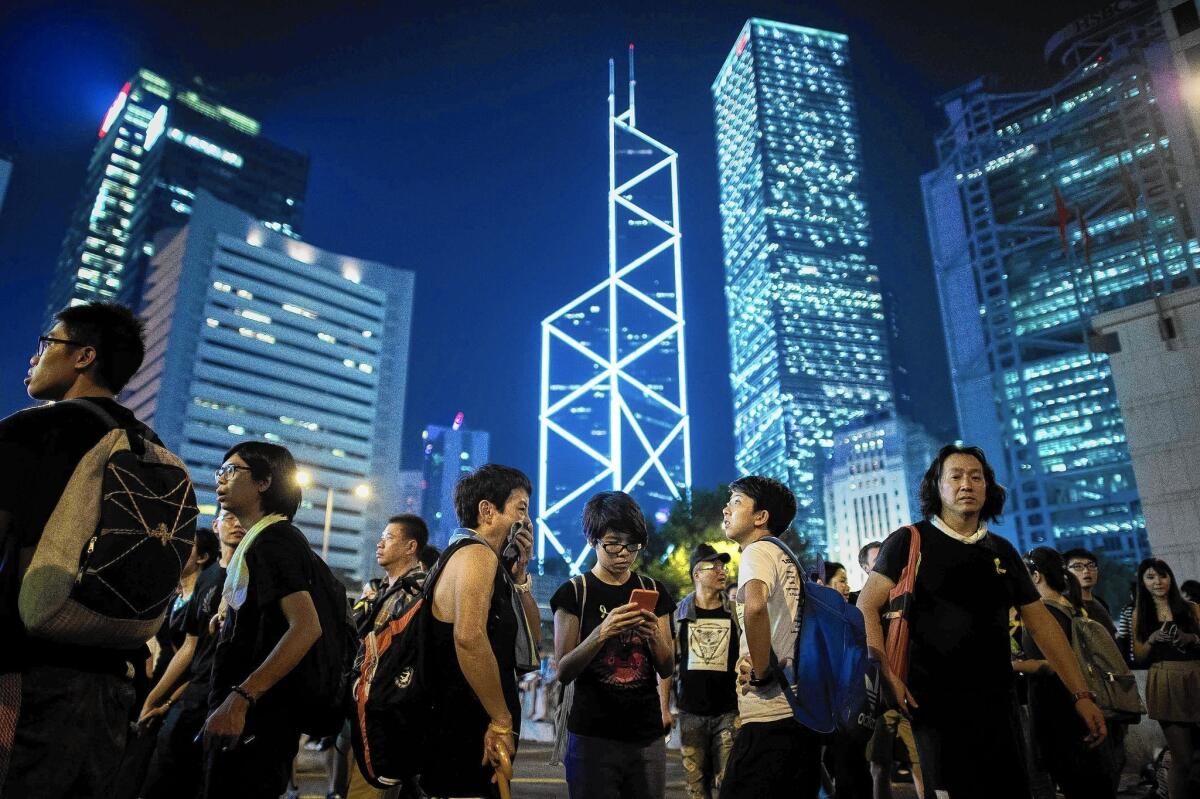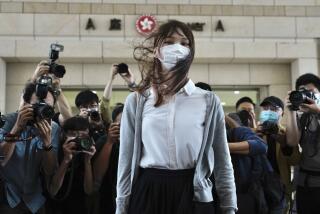Hong Kong-China relationship is changing amid new dynamic

The colorful skyscrapers and massive luxury shops glistening along both sides of Hong Kong’s harbor offer architectural proof of the economic boom that hit this city after Britain handed the former colony back to China in 1997.
To many of the pro-democracy demonstrators now clogging Hong Kong’s streets, however, it’s been a financial deal with the devil.
“What’s my daughter’s future going to look like?” asked 55-year-old Gary Ng, sitting with his wife amid a sea of protesters in the city’s financial district. “She’s graduating soon, and it’s not like when we were young. Who knows what kind of job she can get?
“Housing prices have gone crazy, and no one running this city seems to have solutions. We need our own politicians in charge.”
The demonstrations that have paralyzed parts of the city since Sunday were touched off by new ballot regulations that allow Beijing to control who is selected as Hong Kong’s chief executive. But the real debate is about economics as well as elections — and a profound shift that has transformed the nature of the relationship between Beijing and the former British colony.
Along with a deep sense of righting a historical humiliation, economics were a large part of why Beijing pushed so hard in the 1980s and 1990s to recover Hong Kong. Back then, Hong Kong had everything China wanted: wealth, international connections, membership in global trade organizations. Those assets, Beijing realized, could help pull China out of decades of communist isolation and serve as a model for industrializing and modernizing the mainland’s backward, agrarian economy.
Now, 17 years after Hong Kong was handed back to China under a noninterference policy known as “one country, two systems,” much of what mainland leaders envisioned has come true. With assistance from Hong Kong, China became the world’s factory floor, and its economy has grown from seventh-largest in 1997 to No. 2 today, behind the United States.
Hong Kong has flourished too as a result of the economic interdependence, and it still provides China a unique bridge to the global economy. But its relative strength vis-a-vis Beijing has eroded substantially as the mainland economy has soared even faster and other Chinese cities, such as Shanghai, have started to offer many of the financial services once available only in Hong Kong.
Meanwhile, Hong Kong’s position as the stock exchange of choice for Chinese firms with global aspirations has also eroded; this year alone, Alibaba, Weibo and JD.com have launched large initial public offerings in New York.
That dynamic, analysts say, has emboldened mainland leaders to take a more assertive stance on Hong Kong affairs, including Beijing’s decision last month to announce detailed rules for the 2017 elections. A screening committee, Beijing ruled, has to approve all candidates for the city’s top leadership post; the protesters now taking to the streets say that violates China’s 1997 promise to allow free elections in 2017.
“Many Hong Kongers feel Beijing is playing a game; they’re trying to exercise their political muscle by tightening the economic relationship and making Hong Kong more dependent on China’s economy,” said Dixon Ming Sing, an associate professor of social science at the Hong Kong University of Science and Technology.
“Many people now think that those promises of ‘one country, two systems’ were just an ad hoc solution to fool Hong Kongers and buy time, that Beijing just didn’t want to kill the golden chicken that was laying a golden egg for China at that time.”
Hong Kong has become so intertwined with mainland China in the last 17 years that some observers say Beijing doesn’t need to think about putting down the demonstrations with military force; there are other levers that could quickly be pulled to bring the agitators to their knees.
Beijing could simply shut off its taps, depriving Hong Kong of most of its water supply, at least one official has noted. It could close the land borders, cutting off food sources. It could shut Chinese airspace, in effect closing Hong Kong’s airport, and seal off Chinese waters, thereby shutting the port.
“They could do all this, and within a week, Hong Kong people would be thirsty and hungry and jobless,” said Michael DeGolyer, professor of government at Hong Kong Baptist University. “In economic terms, the fundamental dynamic is that China holds all the cards.”
Migrants and tourists from the mainland, many with deep pockets, have poured into Hong Kong, a city of 7 million. They come to shop and study; some find ways to stay. In 2010, 20 million mainlanders visited Hong Kong; last year, the figure rose to 41 million. And the government has projected 100 million could come annually by 2020.
The benefits of interdependence have accrued disproportionately to the city’s upper crust. Hong Kong’s GDP has risen by 50% in the last decade, but median household incomes have risen by only about 10%. And the average income of people younger than 40 actually dropped by more than 11% between 2000 and 2010, census data showed.
The tide of mainland migrants and tourists has driven up the prices of everything from baby formula to housing. Storefronts once occupied by mom-and-pop shops have been taken over by retailers catering to the swarm of mainlanders, whom some Hong Kongers have derided as “locusts.”
At the same time, the territory has been struggling with a rapidly aging population. Quirks in Hong Kong’s pension system mean many people are forced to retire at 60 but can’t draw benefits until they are 65. In a survey conducted by the Hong Kong Transition Project, a long-term study of the territory’s move from British to Chinese sovereignty, about half of the younger people said they were giving some portion of their salaries to parents and grandparents to help them get by.
Beijing-appointed government officials have been slow to address such bread-and-butter issues. So many people are upset with the state of affairs that in a survey conducted two weeks ago by the Chinese University of Hong Kong, 1 in 5 people said they would consider leaving the territory for a life overseas.
The emigration sentiment was strongest among young people with higher educations, the exact group that is driving this week’s massive demonstrations. This generation, DeGolyer said, feels strongly that the current crop of administrators isn’t looking out for the people’s interests, and that only a truly democratic system can change that.
“This economic dynamic is what’s driving frustration,” he said.
Hong Kongers, said Sing, “feel their dignity and autonomy have been chipped away at an increasing rate in the last few years.”
Those feelings of alienation were reinforced last week when Hong Kong university students launched a class boycott over the election issue.
As the students sweltered in the heat, Chinese President Xi Jinping was schmoozing with a delegation of 70 friendly Hong Kong tycoons in Beijing. His message to the billionaires: A wide-open vote for the city’s next leader was out of the question; all candidates would have to be screened to ensure they are friendly toward mainland China.
Meanwhile, Carrie Lam, the top Hong Kong official in charge of managing the process of finalizing rules for the 2017 vote, announced she was going on a five-day holiday.
“Literally, the local government said, ‘We’re not listening, we’re on vacation.’ And the national government said, ‘The people who really count are the rich ones,’” said DeGolyer. “That’s why you now have such furiousness, anger and alienation on the streets.”
With street-clogging demonstrations in their third day Tuesday, Hong Kong authorities showed no signs of willingness to compromise, but also no indication that they intended to deploy riot police, as they had Sunday. Officers’ use of tear gas against demonstrators shocked many Hong Kongers and prompted bigger crowds to pour into main thoroughfares Monday.
Beijing-appointed Chief Executive Leung Chun-ying called on protesters to stop blocking major streets and go home.
At the same time, he warned that the rallies “will last for a relatively long time … and the cost to Hong Kong’s international image will grow bigger and bigger. I hope everyone can consider these issues.”
Leung stopped short of issuing a deadline for protesters to leave the streets and said he would not deploy the mainland Chinese military, the People’s Liberation Army, to quash the demonstrations. He also rejected calls to resign.
On Wednesday, China will mark National Day, which this year celebrates the 65th anniversary of the founding of communist China. Most Hong Kongers have the day off, which could add substantially to the crowds in the streets. However, thunderstorms threaten to damp turnout.
The apparent willingness of Beijing to take a wait-and-see approach, analysts say, reflects the fact that Hong Kong is not the essential economic link it once was.
At the same time, though, the lack of a swift and strong crackdown shows Beijing still regards Hong Kong as important enough to tread carefully.
“Yes, Hong Kong’s GDP as a proportion of China’s GDP has declined dramatically, but Hong Kong is still making a significant economic contribution,” said Sing. “I think that’s why the leaders of the protest movement haven’t been arrested, and why ‘one country, two systems’ has not entirely crumbled, though it’s suffered a lot of erosion.”
More to Read
Start your day right
Sign up for Essential California for news, features and recommendations from the L.A. Times and beyond in your inbox six days a week.
You may occasionally receive promotional content from the Los Angeles Times.







